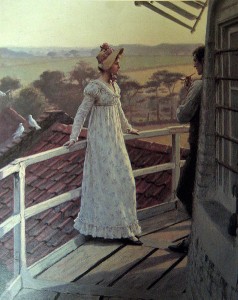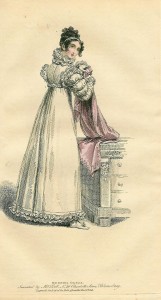 Yesterday I went to an all day workshop with Bob Mayer, who had many good things to say about bringing your germ of a story idea to fruition into a full-fledged novel.
Yesterday I went to an all day workshop with Bob Mayer, who had many good things to say about bringing your germ of a story idea to fruition into a full-fledged novel.
But he said one thing that gave me, as an author of historical romance, pause….
He said that the best way to do research was from the novels of successful authors in your genre. The best way. He mentioned a best-selling author of military thrillers who researched from other books in his genre.
Bob’s point was that readers have already shown that they like the world created by the best-selling author, so, even if it is inaccurate, it is what sells.
 In fairness to Bob, he was talking about the sorts of books he writes, not Regency romance, but it made me think about our ongoing debate about the importance of historical accuracy in “our” books. Regency authors (like our marvelous Myretta Robens) love to discuss the pros and cons of historically accurate Regencies to “wallpaper historicals” to those who just get it wrong. And we’ve often talked about the tiny Regency inventions Georgette Heyer put in her books to catch the authors who were using her for their history.
In fairness to Bob, he was talking about the sorts of books he writes, not Regency romance, but it made me think about our ongoing debate about the importance of historical accuracy in “our” books. Regency authors (like our marvelous Myretta Robens) love to discuss the pros and cons of historically accurate Regencies to “wallpaper historicals” to those who just get it wrong. And we’ve often talked about the tiny Regency inventions Georgette Heyer put in her books to catch the authors who were using her for their history.
To me part of the fun of writing historicals is to fit the real history into a story that (hopefully) will appeal to the modern reader, but that is not necessarily every historical author’s goal nor is it necessarily what every reader of historicals enjoys.
Bob did mention that the best way to research setting is to actually go to the place and see it for yourself. If that was not possible, he advocated using books, websites, videos, maps to get the setting right. He did stress the importance of getting time and distance correct, which is something that sometimes bugs me in historicals. When I read of characters sailing here and there or traveling by carriage here or there in modern rates of speed, it does pull me from the story and tempt me to throw the book against the wall.
But does even that bother readers?
What do you think? Does any of this matter to you?

Nothing pulls me out of a story faster than a glaring error, and I don’t mean the occasional typo or punctuation miss. It matters not to me if it’s historical or contemporary. Make sure the facts are right. I’ve been turned off by a lot of popular writers who come across as too lazy to check the facts and so is their editor. From visiting various websites and reading comments on FB, historical fans are far less forgiving when the author “gets it wrong.”
I’ve been trying to figure out why this bothers me so much, and then I remembered. The first Dan Brown novel I read was “Angels and Demons.” He had his list of “facts” at the start of the book. He does state it’s a work of fiction; I enjoy reading books that weave facts into the fiction. I read the entire book using his premise of facts. Then I did my homework and discovered his “facts” weren’t. He twisted and manipulated facts to meet his ends. I will never read another book by him. I’ve put other authors on my No list because they play fast and loose with the facts. There are too many authors out there who do their homework and work hard to write a good story to bother with lazy authors. Stepping off the soapbox.
I haven’t read Dan Brown, but I am appalled that he would say things are “facts” that aren’t facts! That’s even more misleading than just ignoring facts.
Because I love research so much (sometimes too much!) I tend to expect it in the historical romances I read. There are lots of resources out there and I am not above zipping an e-mail off to an expert for a tiny detail just to make certain I get it right. (Robert Jeffries with the Thames Police museum is such a great guy and will go to great lengths to answer a question!)
And like you, O Divine One, I get very put out when someone fudges the time and effort it took to drive by coach, or carriage or to sail to a certain location when there are myriad resources out there to help an author get it right.
Of course this could all be because I collect Regency reference books like some people we know collect Wellington memorabilia! 🙂
Louisa, you are definitely a kindred spirit!!!
Piggy-backing off the research of others seems like it would be very limiting. Sometimes my stories take me where other authors haven’t gone. There’s only one published romance I know of with a lot of ballooning in it. In that one, the hero has a hot air balloon, which is very different from my hero’s hydrogen balloon.
I do think it’s good to know if there are reader expectations based on what is popular. If I’m going to deviate then at least I know I have to write it in such a way that it seems convincing. However, there’s such a variety in published Regency-set romance–some extremely well researched, some less so–that it’s hard to guess what readers believe.
I would assume that readers would not care that there weren’t any dance cards during the Regency (that we know of, that is), but I still prefer not to put them in my books.
Up front: No, that’s not the right way to research historical fiction. I can’t speak to other genres, but I know Regencies are rife with novels that play fast and loose with the facts. If all I did was copy information from other authors, I wouldn’t know which was accurate and which wasn’t.
Now, to play the Devil’s Advocate: I have discovered, both as a reader and as a writer, the danger of varying from “what we all know.” (Ergo, the version of history published in other popular novels.) Most readers don’t research a time period, so after reading ten books that mention “getting the nod to waltz,” they assume that was A Thing. If your book doesn’t follow along with the popular trends, you may get reviews from the author knocking you for inaccuracy. Curses!
You make a great point, Nancy. I’ve had that happen to me.
As a reader, facts do matter to me in fiction. I almost wrote “especially historical fiction”, then stopped to ponder that. If a contemporary novel is set in a real place, then I expect the depiction of that place to be accurate. If it involves a profession or procedure (e.g. police, court, or law), again I expect it to be accurate. But if it is set in a generic place with normal life going on, because we live in the same time we will know how it all works and the likelihood of the author getting things wrong is lower.
The deliberate manipulation of real historical events or people is unacceptable to me unless the author identifies precisely what she has changed. The distance between places and how long it took to travel between them should be accurate. The use of titles and the way in which society operated, likewise. Given the ease with which such matters can be verified now, failure to do so is sheer unprofessional laziness.
All that said, there are certain genres which have almost created a parallel reality, such as Heyer Regencies and crime/mystery novels.
Heyer carried out meticulous research (at a time when that necessitated spending days in the British Library rather than Googling). She then created her own world based on that research, and that has almost become the “real world” for novels set in the same period. If a writer deviates from it, she has to cite her authority or be suspected of getting things wrong.
Similarly, over more than a century a tradition has been established about how things work in mystery novels. The harsh reality of modern policing doesn’t sit well with the more gentle exploration of characters, their relationships, and their motives which is what readers like about mysteries. There are different types of crime investigation novels, on the scale from almost real crime up to very cosy mystery, so that readers can chose what they like to read, and it is tacitly accepted that those on the gentler end are not totally accurate.
So maybe it’s about reader expectation? Someone reading a traditional Regency in the style of Heyer knows the world she will find, whether it is truly authentic or not. But just as Heyer knew which carriage was used for which occasion and how long it took to get from A to B, so should the author following in her footsteps. In fact, the best way to learn her world is to read all her novels – which is what Bob Mayer was advocating.
If you want to write what might be termed more pure historical novels, then you really do need to get your facts right. Readers are often very knowledgable about the periods they favour – often from reading hundreds of carefully researched novels!
Mayer was, of course, talking about the best way to ensure that your book is a best seller, rather than the best book ever written about your subject. His logic seems good.
PS
I should add that not all bestsellers are alike. Some, such as the Dan Brown books and 50 Shades, become notorious for their inaccuracies. Even if your goal is a merely to produce a best seller I would hesitate before imitating them – although if enough authors do so, another alternative reality may be created!
[…] started out with Real Research? a discussion of whether it’s OK to base one’s research on that of popular authors in […]
Late to the party here, as usual, but I have to agree with those who decry lack of real research in regencies…I have one particular pet peeve. If I recall correctly, one chronicler of the period (Gronow I think) mentioned the stale cake and weak punch or orgeat or something like that at Almack’s. I don’t doubt it was not always the finest in epicurean delights, but I can’t believe they never served anything better! Yet that stale cake appears in almost every novel that sets a scene at Almack’s — and even though it is supported by an almost-original source (Gronow wrote decades after he actually attended Almack’s), I simply don’t believe it. Why, when I attended Almack’s, I distinctly remember the cake as quite fresh and moist!! So there.